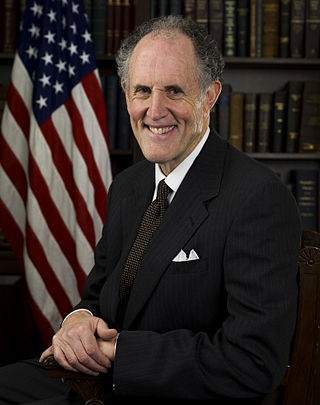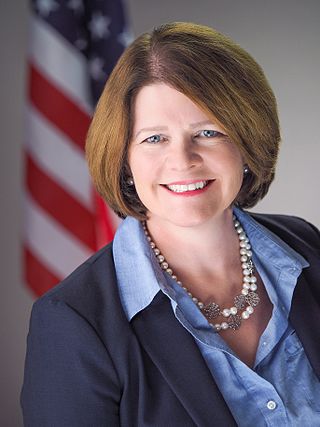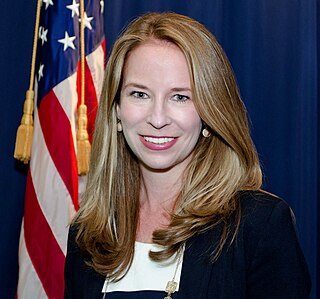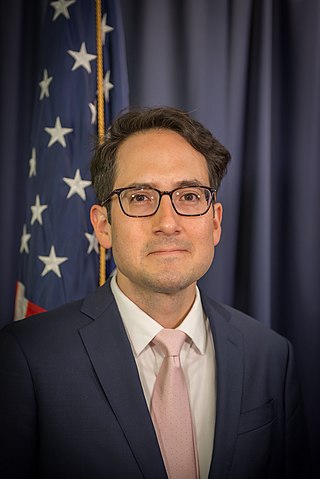
The Federal Trade Commission Act of 1914 is a United States federal law which established the Federal Trade Commission. The Act was signed into law by US President Woodrow Wilson in 1914 and outlaws unfair methods of competition and unfair acts or practices that affect commerce.

The Federal Trade Commission (FTC) is an independent agency of the United States government whose principal mission is the enforcement of civil (non-criminal) antitrust law and the promotion of consumer protection. The FTC shares jurisdiction over federal civil antitrust law enforcement with the Department of Justice Antitrust Division. The agency is headquartered in the Federal Trade Commission Building in Washington, DC.

The U.S. House Committee on the Judiciary, also called the House Judiciary Committee, is a standing committee of the United States House of Representatives. It is charged with overseeing the administration of justice within the federal courts, federal administrative agencies, and federal law enforcement entities. The Judiciary Committee is often involved in the impeachment process against federal officials. Because of the legal nature of its oversight, committee members usually have a legal background, but this is not required.

The United States Senate Committee on the Judiciary, informally known as the Senate Judiciary Committee, is a standing committee of 21 U.S. senators whose role is to oversee the Department of Justice (DOJ), consider executive and judicial nominations, and review pending legislation.
The Senate Judiciary Subcommittee on the Constitution is one of eight subcommittees within the Senate Judiciary Committee. The subcommittee was best known in the 1970s as the committee of Sam Ervin, whose investigations and lobbying — together with Frank Church and the Church Commission — led to the passage of the Foreign Intelligence Surveillance Act.
The Senate Judiciary Subcommittee on Criminal Justice and Counterterrorism is one of six subcommittees within the Senate Judiciary Committee. It was previously known as the Subcommittee on Crime and Terrorism

The Celler–Kefauver Act is a United States federal law passed in 1950 that reformed and strengthened the Clayton Antitrust Act of 1914, which had amended the Sherman Antitrust Act of 1890.
United States House Judiciary Subcommittee on the Administrative State, Regulatory Reform, and Antitrust is a subcommittee within the House Committee on the Judiciary. The Subcommittee's equivalent in the Senate is the Senate Judiciary Subcommittee on Competition Policy, Antitrust and Consumer Rights. It was previously known as the Subcommittee on Antitrust, Commercial and Administrative Law.

The United States Department of Justice Antitrust Division is a division of the U.S. Department of Justice that enforces U.S. antitrust law. It has exclusive jurisdiction over federal criminal antitrust prosecutions, and it shares jurisdiction over civil antitrust enforcement with the Federal Trade Commission (FTC).
United States Intelligence Community Oversight duties are shared by both the executive and legislative branches of the government. Oversight, in this case, is the supervision of intelligence agencies, and making them accountable for their actions. Generally oversight bodies look at the following general issues: following policymaker needs, the quality of analysis, operations, and legality of actions.

Edward Emmett Kaufman is a retired American politician and businessman who served as a United States senator from Delaware from 2009 to 2010. He chaired the Congressional Oversight Panel for the Oversight of the Troubled Asset Relief Program; he was the second and final person to hold the position, succeeding Elizabeth Warren. Kaufman is a member of the Democratic Party and a key ally of former President Joe Biden.

Rachel Elise Barkow is an American professor of law at the New York University School of Law. She is also faculty director of the Center on the Administration of Criminal Law. Her scholarship focuses on administrative and criminal law, and she is especially interested in applying the lessons and theory of administrative law to the administration of criminal justice. In 2007, Barkow won the Podell Distinguished Teaching Award at NYU. In the fall of 2008, she served as the Beneficial Visiting Professor of Law at Harvard Law School.

Preserving Our Hometown Independent Pharmacies Act of 2011 is legislation that was introduced in the 112th United States Congress on May 23, 2011, with the full title of the bill stating to "ensure and foster continued safety and quality of care and a competitive marketplace by exempting independent pharmacies from the antitrust laws in their negotiations with health plans and health insurance insurers". The chief sponsor of the legislation was Republican Tom Marino (R-PA10), while other notable co-sponsors include Republican Cathy McMorris Rodgers (R-WA5), Democrat Leonard Boswell (D-IA3), and Republican Austin Scott (R-GA8).

Maureen Kraemer Ohlhausen is an American lawyer who is a former Commissioner of the Federal Trade Commission, a position she held from April 4, 2012, to September 25, 2018. On January 26, 2017, President Donald Trump designated Ohlhausen to serve as Acting Chairwoman of the FTC. In January 2018, she was nominated by President Trump to a seat on the United States Court of Federal Claims. Ohlhausen withdrew her nomination for the federal judiciary in December 2018, opting instead to join Baker Botts as partner and co-chair of the firm's antitrust practice.

Terrell McSweeny is an American attorney who served as a Commissioner of the Federal Trade Commission from 2014 until 2018.
Corwin D. Edwards was an American economist.

Lina Maliha Khan is an American legal scholar who served from 2021 to 2025 as chair of the Federal Trade Commission (FTC). She is also a professor at Columbia Law School. While a student at Yale Law School, she became known for her work in antitrust and competition law in the United States after publishing the influential essay "Amazon's Antitrust Paradox". President Joe Biden nominated Khan to the FTC in March 2021, and after her confirmation she became the youngest FTC chair ever in June 2021.

Alvaro Martin Bedoya is an American attorney and government official who has served on the Federal Trade Commission (FTC) since 2022.

The AmericanInnovationandChoiceOnline (AICO) is a proposed antitrust bill in the United States Congress. The legislation was introduced by David Cicilline (D-RI) in the House of Representatives as the AmericanChoiceandInnovationOnline Act on June 11, 2021. On October 14, 2021, companion legislation in the Senate was introduced by Amy Klobuchar (D-MN) and Chuck Grassley (R-IA) as S.2992.

The State Antitrust Enforcement Venue Act of 2021 is a proposed antitrust bill in the United States Congress. The legislation was introduced in the House of Representatives by Ken Buck (R-CO) as H.R. 3460 on May 21, 2021. Companion legislation was introduced in the Senate by Mike Lee (R-UT) as S. 1787 on May 24, 2021.
![]() This article incorporates public domain material from websites or documents of the United States Government .
This article incorporates public domain material from websites or documents of the United States Government .









